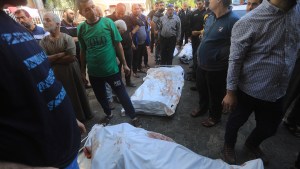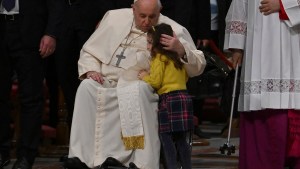Fr. Anthony Giambrone, a Dominican friar from the United States, has lived in Jerusalem for several years, studying and teaching the New Testament at the École biblique et archéologique française de Jérusalem – the French Biblical and Archeological School of Jerusalem. On Saturday, October 7, he was leading a couple of Dominican nuns on a tour of Jerusalem, when air raid sirens began to sound and bombs could be heard in the distance.
Fr. Giambrone is accustomed to occasional bouts of violence in Jerusalem, but this was different.
“This is the first time that we’ve had air sirens here and heard bombs exploding. That’s not every day in Jerusalem,” he said in an interview by Zoom this week.
It was the beginning of Operation Al-Aqsa Flood, conducted by Hamas, the Palestinian organization that has ruled the Gaza Strip since 2007. The initial attack included the launch of some 5,000 rockets from the Palestinian territory into various parts of Israel, and the raiding of military sites, Jewish villages and kibbutzes, and a music festival in the south of the country. The first day left a death toll of more than 1,400 and saw the capture of almost 200 hostages.
Israel has been responding by launching airborne attacks on what it believes to be military targets in Gaza City and other areas of the strip, a territory twice the size of Washington, DC. The Jewish state also has imposed a siege on the territory, cutting off the flow of food, water, fuel and medicine.
For Fr. Giambrone and his colleagues and students at the École biblique, like most people in the Israeli capital, the conflict is a heightening of an already tense situation. It also brings a new focus on a territory that, the priest says, has been kept at arm’s length for some time.
But, he adds, it is also a time when the unsustainability of the situation for Palestinians is crying out for a workable solution.
Restrictions
A 2000 graduate of Franciscan University of Steubenville, Fr. Giambrone, 46, studied at the École biblique and returned to teach there after completing a doctorate at the University of Notre Dame in 2015. He is serving as interim director of the École until the new director, Dominican Fr. Olivier Poquillon, arrives. Fr. Poquillon, who since 2019 has been overseeing the restoration of the Dominican Friary of Notre-Dame de l’Heure in Mosul, Iraq, has been attending the Synod of Bishops assembly in Rome.
For Fr. Giambrone, as a Scripture scholar and a Christian, Jerusalem, with its holy sites and its archaeological sites, is “incredibly stimulating.”
“But it’s tense,” he adds. He’s become familiar with cycles of violence, from relatively “minor” stabbings to cross-border conflicts. Although there have been flare-ups with Gaza in the past, the present conflict is outside the normal cycle of violence. Until now, Gaza has been psychologically “far away” for most Israelis.
“I mean, they’ve made sure of that,” he said, mentioning the strict border controls that allow only a trickle of Gazans into Israel for work. “So it’s kind of off people’s radar. And this put it on everyone’s radar in a new way.”
His school itself has done excavations in Gaza since 1995 but has great difficulty getting permission to visit the ancient Philistine archeological sites.
Fr. Giambrone noted that he lives in an Arab neighborhood in East Jerusalem – technically in the West Bank, a Palestinian territory. He said that in many ways the West Bank also is quarantined from the rest of Israel, with “giant security walls” and special checkpoints that “prevent you from easily going from Israel into the West Bank.”
“East Jerusalem is a kind of special status, but Gaza is not contiguous, geographically, with the rest” of the Palestinian Territories. “It is, for that reason, just a very different kind of social reality,” he said. “It’s down in the [southwest] corner of the country.”
He characterized Gaza City as an “immense enclave of 2.2 million suffering people … behind a big fence.”
Gaza is a “completely different reality that’s very, very tightly guarded, much more than the rest of the West Bank,” he continued. “The situation there is held at a distance, and the violence that goes back and forth between Gaza and the communities right around it periodically is also kind of far from people’s experience here in Jerusalem.”
Jerusalem is “eerily quiet”
Contrary to the day he was playing tour guide to the two Dominican sisters, Jerusalem is “eerily quiet right now.”
“Basically people are being very, very cautious,” he said. “The country is obviously very tense, so even if the center of the fighting isn’t here, there’s a tension in the air everywhere. People are largely staying inside, but you can sense there’s an incredible mobilization, unity, and war effort kind of mentality that’s gripping the Israelis right now, the Jewish population — which is all the more remarkable because it’s a moment of incredible political division.”
He explained that in order to break a political deadlock and form a government, Prime Minister Benjamin Netanyahu “allied with some very dubious extreme parties [who] have a very, very aggressive Zionist ideology [and have been] very actively pursuing the advancement of illegal Israel settlements in the West Bank.”
Tensions have been fueled by, among other things, Jewish settlers building a fortified town in the West Bank or “very radical Israelis” burning down an Arab village.
“The right-wing government is pushing it, financing it, protecting it,” Fr. Giambrone said, “and that just obviously provokes tensions.”
Long build-up
Although Israeli intelligence was faulted for not anticipating Operation Al-Aqsa Flood, the incursion was not a complete surprise.
“There’s been a long build-up,” the priest said. “There have been more deaths in the West Bank this year than there have been since the intifadas [Palestinian uprisings in the 1980s, 1990s and 2000s]. So it’s been teetering on the brink.”
On October 6, the day before the Hamas invasion, the daily newspaper Haaretz carried a headline that suggested Israel was five minutes away from another intifada.
The priest acknowledged that “obviously,” most Palestinians “are very good people, normal people who want to live a peaceful life. But there’s immense resentment, hatred, anger towards Israel and Israelis. And so there’s more sympathy for Hamas than I think a lot of people would want to acknowledge, though there are ways that one could explain that.” The internationally recognized Palestinian leadership in the West Bank is a “failing government” plagued by corruption, for example.
“Palestinians see the Palestinian Authority government as a collaborationist entity that will do nothing to protect their rights, and it can’t even hold the line on the status quo. So they think Israel is determined not to pursue a two-state [solution] or peace process; they’re just going to slowly annex the entire West Bank,” he said. “And they see that the Palestinian Authority, which is in control in the West Bank, can’t and won’t do anything to stop that.”
Among Israelis, there is a sense of being in it together. “Everyone knows someone who was killed or is a hostage,” Fr. Giambrone said. “This touches everyone, and it’s a country that is highly militarized: Everyone does military service. So they called up all these reservists, and that’s [basically] everyone.” Even the school’s teacher of the Akkadian language is serving in the military right now and thus can’t teach his classes.
Simultaneously, there is an atmosphere of uncertainty concerning the ground invasion – which is anticipated to be extremely dangerous for all involved. There are also questions about whether hostilities will expand beyond Gaza to include the West Bank and the north of Israel, with a potential invasion of Hezbollah from Lebanon.
“Whatever scope it takes, even if it just stays in Gaza, it’s going to reconfigure some very fundamental features, not just in Israel but in the politics of the Middle East, and therefore geopolitically,” Fr. Giambrone said. “So it’s a very important moment, and it’s sitting on a knife edge.”



